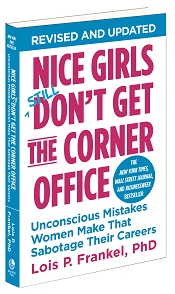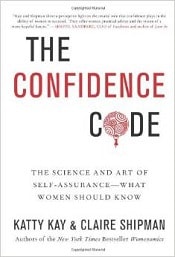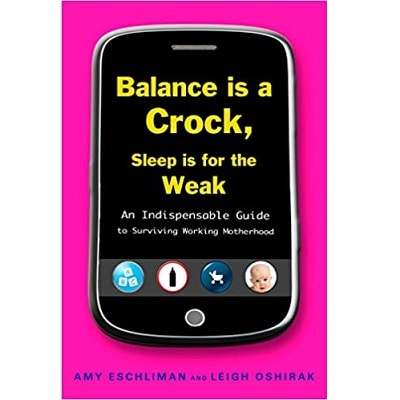This post may contain affiliate links and Corporette® may earn commissions for purchases made through links in this post. As an Amazon Associate, I earn from qualifying purchases.

Reader L has a question about looking competent and professional, without looking like the assistant who thinks she's the VP… Specifically, how can she look professional without looking like she thinks she's in charge?
I recently started a job in a large creative nonprofit in New York. It is a conservative place- no open shoes, hose or tights at all times. This is fine, except it creates another problem. Hard to describe why this is wrong, but in a suit, I look like a vice president. Polished, mature, and competent.
Why is this a problem? Because I’m not! I don’t have all the answers — frankly, I’m still trying to figure out a system for getting to work on time. The problem with my look right now is that I’m afraid I can’t deliver, and/or I’m putting off my supervisors. I want my bosses to see themselves in me yet at the same time I don’t want to come across as arrogant or immature. It’s further complicated because as a new hire I’m entering an already inhabited space. I’m the newest addition to a group of young people, all of whom have their own career goals.
What do you suggest for a look that says competent and professional, but also young, creative, and teachable? That will help me stand out from my coworkers without alienating my peers?
This is a great question, and one that I think a lot of young women struggle with when they enter the workforce. Ultimately, don't worry too much if you're mistaken for Someone Who Knows What's Going On — just help them if you can, and if not redirect them with a smile. (Entire careers have been made out of this!)
{related: The Ultimate Guide to Business Casual for Women}
Still, it can be tricky to avoid looking and acting young, or to avoid look like you think it's “Dress Like Your Favorite CEO” day (by, say, being an intern and carrying a $9K handbag).
We've talked before about which workwear basics may be helpful to a woman just starting her career — but if those suggestions don't help, some additional tips on looking like the eager, young professional you are:
First, make a “do not wear” list by looking around you — is there a cultural divide between what the the secretaries and the executives are wearing? (In a lot of big offices, particularly in New York, there may be.) If there is, make sure you identify what you should avoid. It may be bracelets layered on top of one another that clank when you walk down the hallway — or it may be a suit that looks like something from the 80s.
Co-opt just enough of the executives' style to show you're a member of that group. It may be a layering technique — if the women wear trousers, blouses, and blazers, look for the same for yourself. It may be the details — understated jewelry and makeup, simple hair, sedate colors.
More youthful details are okay — color and fit will be the main ones — but try to keep the overall sense of “taste” at the same level as the executives you work with (and avoid veering into secretary territory). Sometimes, budget-friendly swaps will be necessary — e.g., a colorful statement necklace for $50 rather than a $3000 set of pearls — but try to be mindful of the office culture. I would advise that you should have less clothes of better quality, rather than a new outfit a day from stores specializing in knock-offs and fast fashion.
Check out our Wardrobe Essentials for Work — all the reader favorites!
Recognize that “teachable” is a great quality — but that you can project authority at the same time. Carry a notepad and a pen with you to all meetings, and take notes. Respect your superiors' time — don't launch into long stories without prompting, and think before you speak (I've even jotted down questions before asking them at meetings) — it will help prevent youthful speech patterns (“um”) as well as, hopefully, shortening what you have to say.
Journalists talk about the “nut graf,” entrepreneurs talk about the “elevator pitch” — both of these things stress a way of speaking that is concise and information-packed.
By the same token, try to think of your bosses as your friends and mentors. When time allows, ask them what they're reading, or what their favorite industry association is. Do your best to contribute thoughtful things to the conversation, both when it's work-related and when it isn't. I've even continued the conversation when I've seen an article, or had what I deemed to be an interesting thought, by dashing off a friendly but quick email to my superior.
Freely admit what you don't know — but follow it immediately with the steps that you'll take to learn about it and answer the question. “I'm not familiar with __, but I'll get back to you in 5 minutes after I check out their website and look at some of their other collaborations.” (If you're constantly getting questions that stump you, try to befriend someone you respect at an intermediate level between you and the boss — mentors can be from all levels.)
Readers, have you noticed this problem in your own workplaces (if not your own careers)? What tips do you have on how to look professional without looking like you think you're in charge?
2021 updated images via Stencil. Originally pictured: Photo submission 2 – Kids in Flushing, originally uploaded to Flickr by seventrainphotos.
Some must-read business books for women — update coming soon!






anon
The ultimate wardrobing question is “how powerful do I want to look?”. I say go for the power look with moderation. Maybe your projecting what isn’t there. And if you’re struggling to arrive on time, looking extra smart & crisp is a good thing.
Melissa
I struggle with this exact question. Management wears suits, those who are not management do not. That being said, I prefer not to shop at Kohls and personally prefer a more polished look. Everytime I wear a blazer to the office (and they are NOT overly formal) and between the questions about if I was interviewing somewhere and the “Who’s she trying to be addressed” jeers, I haven’t tried it too many times since.
I guess it’s just easier for me to work well with my coworkers when I don’t look polished. Sad thing is, suits are so easy. I would be more than happy to toss one on every morning so I don’t have to think about my inability to match properly.
Janie
Hmmm maybe you could create “suits” of pants/skirt plus cardigan, that way you have the basics down and only have to figure out the shirt/accessories?
Melissa
That’s what I do right now, though in all honesty it feels “frumpy” sometimes. Maybe that a reason to go out and buy new cardigans?
Janie
I guess you have to figure out whether you feel frumpy because of the particular cardigans/other items or if you really only feel comfortable (i.e. non frumpy) in a blazer/jacket. In the latter case, I don’t really know what to tell you…
Paula
You can mix and match suit pants/skirts and blazers for a less formal look. For instance I bought a nice suit from Ann Taylor. The pants are striped navy (they look super with the matching jacket) but look great, but more casual, with a nice black blazer. I find that if you can pull or roll up the sleeves a bit that helps make the look more casual. You can even find blazers that have 3/4 length sleeves which makes the look less formal as well.
AppealingLawyer
Have you tried belting your cardigan? Or wearing one that is more form-fitting rather than boxy-shaped? I am the former queen of frumpy cardigans so I know what you mean!
PGP
This is an interesting post. In my business casual office, I find that I convey professionalism, without going overboard, by wearing slacks and a sweater w/ scarf or necklace or slacks with a non-matching jacket – I have a pink one, a grey Boden one with a ruffle, purple velvet military one from Talbots, etc. (I also have summertime equivalents).
Mean Girls
I was just re-thinking about the Birkin bag post. How sad is it that you could have such a beautiful/expensive/cherished item and feel like you can’t wear it where you want to. It reminds me of Mean Girls where Gretchen’s parents bought her expensive white gold hoops for Hanukkah but Regina says that hoops are “her” thing so Gretchen can’t wear the hoops. I’m not saying the advice about the Birkin bag wasn’t good advice, because surely people do judge you and you should be aware of that. I just think it’s sad. I’m contemplating buying myself a designer purse ($1,000, not $9,000) and I hate that I have to worry about what people will think.
Lee
Big eye roll – enough with the Working Girl references and sweeping generalization of administraff staffers as frumpy and/or inappropriate dressers. Looking around my office, it’s the managers who deserve that stereotype – not the assistants.
Monday
I also thought the comments about secretaries and support staff came across as an undeserved blanket diss. At my office, some of them look great, and some look a mess–just like everyone else at all other levels.
RH
Seriously. I usually think Kat is pretty on top of it, but this:
“Secretaries may wear clothing ranging from frumpy suits to wholly inappropriate-for-work outfits (tank tops, leggings, skintight dresses)”
What a patronizing overgeneralization. There are assistants in my firm who always look fabulous, and partners who look frumpy. We had one senior counsel who always wore low cut tops, short tight skirts and heels, that just made me cringe. So it really isn’t the person’s level in the organization that matters, it is there level of style.
Really Kat, do you not think there could be executive assistants who read this blog for fashion info?
RH
…er “their” level of style.
Marianne
As an executive assistant who reads this blog for fashion advice, thank you! Support staff doesn’t equal frumpy, inappropriate or tasteless. You’d be hard pressed to tell me apart from the rest of the staff based on how I dress.
Star
This. At my BC office AA’s might wear a suit if they are going to be part of a client meeting while attorneys not part of that meeting are in khakis and polos. The most senior attorney at my firm frequently wears jeans to the office. At least here, there is no “hierarcy of dress” and the rule is dress for the situation.
N
What Kat described is a very accurate description I think–at least where I have worked.
Trunk
Second.
JuliaBee
Third.
Johanna_D
Third.
alhambra
not to stereotype, but there are a small number of women in my office, split between attorneys and admin staff (it’s a small office). The attorneys were business casual while the admins wear jeans, sneakers and pants that are too tight for the office. I’m not saying they look bad or not put together, but these are things that as an attorney I cannot wear to work. I wish I could wear jeans and converse to work, but I can’t and I certainly don’t look down on them for it. It’s very common that the dresscode for the attorneys is different than that for the staff. I don’t think it’s demeaning or condescending, it just is.
Argie
Um – did I miss something? I don’t see anything in the post calling secretaries frumpy.
The point that I see Kat making is that you should look and see if there is a difference in formality/style/whatever between managers and secretaries. And that is absent a judgment about which is better.
Monday
There used to be a detailed description of secretaries’ fashion gaffes, it looks like Kat has edited the post. So, you are missing something, but it used to be there and isn’t anymore.
Anonymous
In my office, the lawyers wear jeans and flip-flops and the receptionist is always dressed like a professional. She is the only person who deals with the public on a regular basis.
LC
I wish I had this problem! I worry that I look about 12 years old no matter what I wear!
Esquirette
Sorry, this got epic, but I hope it helps.
It seems to me that Kat’s answer didn’t exactly address L’s issue except for the last point. I read L’s email as saying that people at her job wear suits, and that she appears to be a senior level employee when she wears one. Her concern seems to be that, while her appearance conveys a high level of expertise, her actual expertise is not yet that advanced. As such, she’s concerned about unintentionally coming across as someone who is “acting” more senior/advanced than she is. The more common issue that is often addressed on this site is the junior employee who really looks like a junior employee and not professional enough.
I sometimes have the same issue as L. When I wear a suit (i.e., primarily when I interact with clients/potential clients), I think I come across as very polished and mature. As my clients are often have a number of years more experience than I do in my own field or related fields, I too have to find a balance in not just walking the walk but also talking the talk -or not- (I flipped the usual saying, as that seemed more appropriate in this circumstance :) ). You can’t change how you look, and I wouldn’t try looking “younger/less experienced” by changing your style as that seems counter-productive –> you have acheived what many people stuggle with regarding professional appearance. I am always forthright about the level of my experience. A common question people ask me is how long I’ve been with my firm, which is an easy way to do it. If that question doesn’t arise, I generally make some reference to my length of time with the firm or areas in which I am interested in developing my practice, which suggests that my practice is still developing. In your situation, if your primary interactions are only with people within your company (who know you and your level), you could make similar statements that are targeted to remind the person talking to you of your level experience. To those outside the company, you could refer to your excitement in the work you have an opportunity to do now that you are with the company. It has to be done carefully – not in a “I don’t know anything b/c I’m new” or “gee, I’m still learning” way – but it can definitely be done.
With regards to your co-workers; your comment seems to suggest that you are in a competitive environment (e.g., how each of your performs or is perceived affects career progression). You have a leg up on the appearance front. There’s nothing to apologize for about it. Your co-workers may have strengths that you don’t have. Focus on your career development and learn like hell until you know what you look like you know. As long as your attitude, personality and interactions with your co-workers is exemplary and fair, then any issues they have are their own to deal with.
Melissa
It isn’t as easy as “keep looking professional – you are a leg up.” I need to maintain excellent relationships with my coworkers so as to maintain their cooperation on projects and not get thrown under the bus. Clothes speak pretty loudly and its hard to make the transition to better clothes without alienating coworkers you desperately need to work well with.
A lot of my issues are very specific to the dynamic of the team I work with and my age. I’m only 23, but I do have three years with the company. We’ve added five people since I have started, but I am still far and away the youngest.
Esquirette
Epic post # 2.
I’m confused on multiple levels. Are you L (i.e. the person who wrote to Kat)? If you are, then I think my response came off other than I intended. If you’re L, I understand your concern about being alienated by your co-workers if they perceive that you are treated as if you know more than you do. If this is the case, I think that my suggestions regarding contextualizing the level of your experience, which was related to Kat’s last point, would help your situation regardless of your wardrobe because it would help adjust people’s expectations of you (e.g., your superiors or others) to your actual experience level and can be an indication to your co-workers that you aren’t trying to be arrogant, etc. And I am not saying in any way to depreciate yourself unjustly or unnecessarily (as is too often a trait attributed to women in the workplace (e.g., too meek or modest)); you just want to convey what you can and can’t deliver.
If you’re not L, then your situation might be different. I can’t really follow up well to clarify without knowing whether you’re L or not. You mention transitioning to “better clothes.” I’m not sure what that means. If you are L, then my understanding of that based on your email would be something that doesn’t make you “look like a vice president.” If that’s not what you meant, then I am totally misreading your email. I think looking polished, mature and confident is what you should strive for. If you think that you’re coming across as austere or rigid or too “professional” for your field, try adding more color or “creative” patterns to your basics (e.g., check out blouses from this site, BR, J. Crew, etc.,etc., add some different colored belts, shoes and necklaces).
Finally, your relationship with your “supervisors” and your “co-workers” isn’t clear. I’m not sure why your professional appearance would be off-putting to your superiors in and of itself – unless you mean because you can’t perform at the level they may be expecting you to (see Kat’s suggestions and my point above on changing up your attire), or are dressing much more professionally than them (which may likely call for a wardrobe re-adjust). With regards to your co-workers — yes, maintaining a good working relationship is key. Taking into account what I’ve already said, your actions while working with these individuals should affect their attitudes about you more than your professional attire. If you work to establish appropriate expectations of your experience level and are not inappropriately getting work opportunities you can’t handle just because it looks like you can, then it would seem that they shouldn’t be concerned with how you look. If you are chosen for something that you can handle just as well as anyone else and it might be in part because you dress more professionally, then, really, isn’t that what you would want?
I hope this clarifies/helps – or hopefully others can – I have nothing left to give. Maybe more details would help – the facts aren’t clear. I rarely comment and I don’t know why I did today but the effect that it’s had on my productivity indicates that this is a bad practice for me. Peace out Corporettes – time to re-lurk.
Ru
Your epic posts are amazing – lots of good advice.
Res Ipsa
I don’t think this question is about clothes at all. When the writer dresses in a suit, which is required at her conservative firm, people take her seriously, people assume she belongs there and is a competent, powerful person. Great! Were that we all have that experience!
It seems the issue is more one of confidence than anything else–as if she perhaps feels like she’s playing dress-up in these adult clothes? I think the advice should be: don’t change anything about the way she dresses! Certainly, don’t dress “down” in the hopes that people will take you less seriously or think that you aren’t an important person worth knowing.
Instead, focus on conveying confidence. Learn how to gracefully express to a client or colleague when higher-level approval/consultation is required, and don’t be afraid to seek direction when needed.
Your supervisors know you are new; they also presumably hired you based upon your abilities (both present and those you are capable of building while on the job). Don’t be afraid to ask specific follow-up questions if you don’t understand something. Find a mentor, whether formal or an informal peer relationship, who you can ask questions that you think are too dumb to be asked of a supervisor or in a meeting.
CW
I agree with this. Don’t feel like you need to dress “down” to convey your inexperience. Dress like the professional that you are.
Don’t be nervous about the fact that you don’t know really anything yet – everybody starts off in that situation. Don’t pretend that you know more than you do, and you’ll be fine.
Esquirette
Yes!
JessC
This X 100,000! I just started my first job last month and know this feeling very well. I am a lawyer, I dress like a lawyer, and people treat me like a lawyer. But part of still has this feeling of being a kid playing dress up. I’m still learning the ropes as far as this job and developing my professional confidence. Don’t be afraid say you don’t know but will find out or ask a superior a question. It’s the only way you’ll learn and develop more confidence.
Angeline
Agreed. Your attitude controls whether a suit comes across as dress-up, pretentious, or just plain ol’ professional.
AN
I agree. This is not about clothes. Also if “L” is dressing well, I really don’t see why that should change. If it’s co workers’ perception, well honestly, you’re never going to please the whole world; you’ll just waste a lot of time trying.
Personally I’d rather look professional AND do a decent job rather than not looking that way.
Ru
Concur.
P
I agree 100%.
E
On a somewhat related topic:
I just found out I have a formal interview with a company with a very conservative corporate culture. I have a medium gray skirt suit, and I’ve ordered these shoes:
http://www.zappos.com/sofft-avant-anthracite-patent
Is patent leather too flashy for an interview? I have no other appropriate heels for a skirt suit. Also, what color shoes would you normally wear with a gray suit– is chianti appropriate for an interview as well? I’ve found that black stands out as being too dark. Thanks!
Guest
I think the patent is probably fine for an interview. I’s say the only possible problem with those shoes is the pointy toe, since round, I think is somewhat more “conservative”. But, really, I think they’re within the realm of reasonable so you should be just find.
With grey suits, I think the key is what else you’re wearing. If you’re wearing black under the suit, black shoes should be fine. I also think the maroon would be fine (I’d avoid bright red). If you’re wearing more in a navy or blue direction, the navy verision of those shoes might be lovely.
E
Thanks!
RB
I do not think my assistant should dress formally. She often has to do ministerial tasks like going into the storage closet to dig out old files, so the last thing she needs to do is wear expensive clothes that get dirty. I have to pay her for overtime already and I do not have to pay for dry cleaning. If I asked her to dress a certain way, then she ruined her clothes, I would have to pay for that. So I let her wear what I call professional casual clothes. These have proven successful so far, and she is happy.
Jade Moon
I’m not in the creative field, I’m a trial lawyer. I’m not young, but I was once. . . long ago and far away. But my advice is: own it! When I was a young lawyer, I always felt I was faking it, appearing to be competent and strong and knowledgeable, when I was actually terrified. And, then, slowly, I *was* competent and strong and knowedgeable.
Some trial lawyers are lucky enough to go to NITA, National Institute of Trial Advocacy. There, we learned to walk into the courtroom as if you own it. Walk confidently to your table. Show your good posture. Control the situation and at least pretend to.
So what if you think you look like a vice president? You really can’t hide youth: your boobs are high, your facial skin is firm, you don’t have lines around your eyes. You look young, together, and well-dressed. That’s a good thing. Own it. You will grow into your look and you will be respected for it.
Opposite Situation
I am in a similar but somehow opposite situation (if that makes any sense!). I want to look more put together than the administrative staff, who tend to dress nicely. At my level there are no other women so I have no one else to look to. The men at my level are all over the place – those with client contact are in full suits and nice ties, those without tend to be a bit more casual.
A
Agree with the suggestions to embrace confidence- enjoy that you can look so professional. Some of us have fuzzy hair etc. that is hard to pull off the polished look despite our competence!
On the clothes, 2 ideas: vary your style- some days wear suits, tone it down for ‘internal’ days, or wear the jacket, but take it off during the meetings. This is what I often do to fit in but also dress nicely at work. Also, high-end separates. Fit, fabric, subtle colors, few nice pieces of jewelry. Doesn’t have to be a suit to look great- at my company some senior women wear cardigans and that type of thing but still look authoritative. It’s the quality of the stuff that often makes a difference, so you can probably tone down the suit thing while still looking very professional. Also non-matching bottoms and jackets tones things down but looks great if done right.
Anon
I always think you need to dress for the job you want.
Margo
I read over this – I’m guessing the OP is tall & lean and/or has great posture. Good posture alone makes one look 10x more polished and “mature” than peers the same age in the same outfit. Ditto for being in good shape.
If you like suits, consider trading the jacket down for something “softer” like a cashmere cardigan in a warm color – it will make you appear more approachable. Alternatively, style a conservative suit and blouse with well-made but younger-styled jewelry – irregularly-shaped turquoise beads instead of pearls, for example.
L
Dear Corporette, I originally asked the question posted here: https://corporette.com/2011/03/10/how-to-look-professional-without-looking-like-you-think-youre-in-charge/#ixzz1j1IY56gW
The answers in the post and comments were incredibly valuable and encouraging; thank you. I’ve been promoted twice and am more comfortable in the way I present myself. I wanted to write back first to say thank you and second to share what I learned since then.
Fashion isn’t generally discussed at work but a professional look is expected. The full suit every day wasn’t right for my office. So a lot of this I’ve had to “feel out” and observe. Then I combined what I observed with what was true to my style and picked up some grooming hacks along the way (dry shampoo!).
While I knew not to wear spaghetti strap tops or shirts with brand names across the chest, I did not know the importance of a good deodorant- finding a brand that worked well with my body did a lot for my self confidence. Keeping dry shampoo and face wipes in my bag helped with long days.
I overestimated jewelry- thought a lot of variety was good- long necklaces, chunky bracelets, etc- so I bought a lot of cheap jewelry from places like New York and Company. It wasn’t my style and I ended up giving a lot of it away. I regularly wear only one or two of these: silver ring, black watch, red watch, pearls, studs, gold necklace with a small medallion.
My real work wardrobe now is primarily dark pants, skirts, and shoes, with color on top- usually warm-toned, thanks to your recommendations.
Knit blazers, scarves, a black coat, lined leather gloves, wool hat, black socks or black tights. Seche vite over any nail polish. Treating shoes before I wear them and continuing to take care of them.
Ultimately, what I found is that what I said and what I did ended up mattering far more than anything I wore. Being forthright about my experience and following that with action steps worked with senior staff. Learning about emotional intelligence, having respect for myself, and finding common ground helped me with my peers. I still approach dressing myself and shopping very carefully, first because I have a very limited budget, and second because a lot of time and attention at the beginning save me time and worry in the morning, but I’ve also spent time learning how to stand calmly, speak clearly, and do good work.
Thank you!!!
Ana
This is a great post. I would say a must read for new professionals as well as seasoned professionals. I have seen many that because they find themselves comfortable in the office they start “slacking.” Thank you for the reminders.
http://anakiyasworld.com
Ana